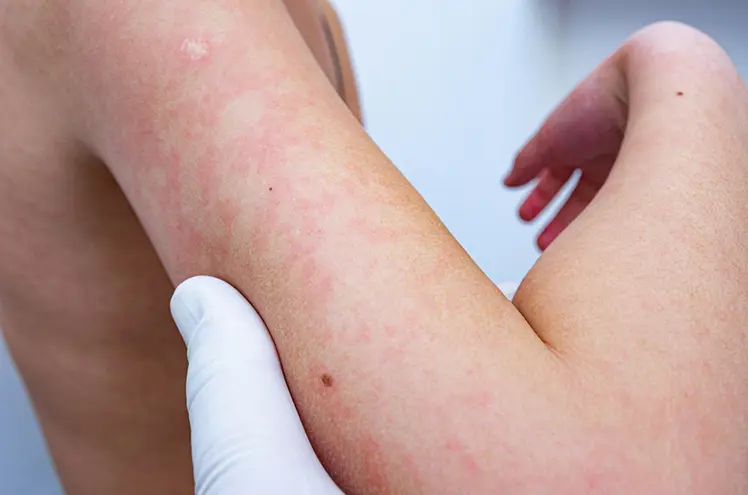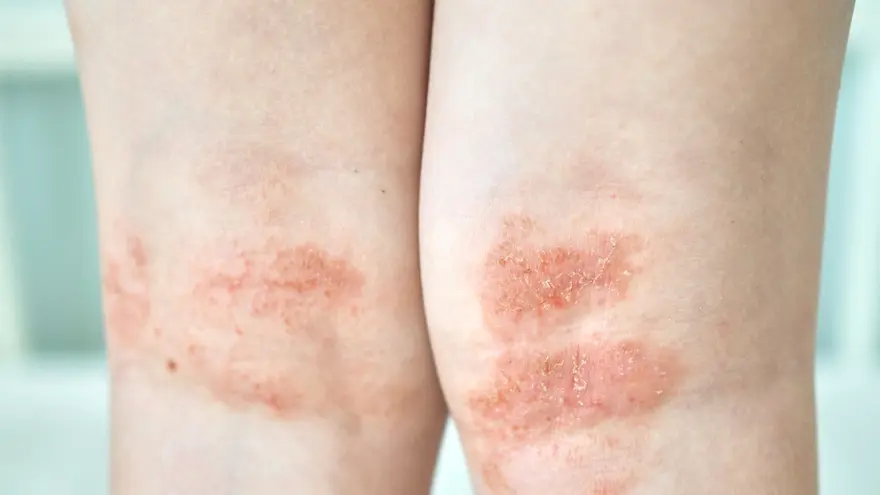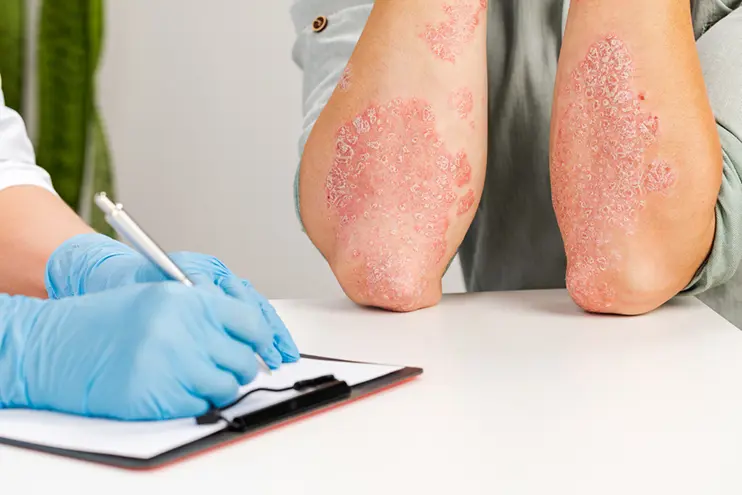Eczema (Dermatitis)
- Home
- Eczema (Dermatitis)
Our Doctor

Dr. Rahul Sheshgiri
Dermatologist & Cosmetic Doctor
Eczema (Dermatitis)

Introduction
Eczema, also known as dermatitis, is a common skin condition characterized by inflammation, itching, and irritation. While eczema can affect individuals of all ages, it is particularly prevalent in children, with many cases improving or resolving over time. However, for some individuals, eczema can persist into adulthood and require ongoing management to control symptoms and prevent flare-ups. In this comprehensive guide, we delve into the world of eczema, exploring its causes, symptoms, and effective management strategies to provide relief for those affected by this chronic condition.
What is Eczema (Dermatitis)?
Eczema, or dermatitis, refers to a group of inflammatory skin conditions characterized by red, itchy, and inflamed skin. There are several types of eczema, each with its own distinct characteristics:
Atopic Dermatitis: Atopic dermatitis is the most common form of eczema and often begins in infancy or early childhood. It is characterized by dry, itchy skin, redness, and the development of small, fluid-filled bumps that may ooze and crust over.
Contact Dermatitis: Contact dermatitis occurs when the skin comes into contact with an irritant or allergen, leading to localized inflammation and redness. Common triggers include soaps, detergents, cosmetics, metals, and certain fabrics.
Nummular Dermatitis: Nummular dermatitis is characterized by coin-shaped patches of red, scaly skin that may be itchy or tender. This form of eczema often occurs on the arms, legs, or torso and may be triggered by dry skin, irritants, or environmental factors.
Seborrheic Dermatitis: Seborrheic dermatitis affects areas of the body with high sebum production, such as the scalp, face, and upper chest. It is characterized by red, oily patches of skin covered with yellow or white scales and may be associated with dandruff or cradle cap in infants.
Causes of Eczema
The exact cause of eczema is not fully understood, but several factors may contribute to its development:
Genetics: Individuals with a family history of eczema, asthma, or allergies may be more prone to developing eczema themselves, suggesting a genetic component to the condition.
Immune System Dysfunction: Eczema is thought to involve an abnormal immune response that leads to inflammation and skin barrier dysfunction. Factors such as environmental allergens, irritants, and stress can trigger or exacerbate this immune response.
Skin Barrier Dysfunction: The skin barrier plays a crucial role in protecting against moisture loss and environmental irritants. In individuals with eczema, the skin barrier may be compromised, allowing irritants, allergens, and bacteria to penetrate more easily and trigger inflammation.
Environmental Factors: Environmental factors such as dry air, low humidity, and exposure to irritants or allergens can exacerbate eczema symptoms and trigger flare-ups in susceptible individuals.
Symptoms of Eczema

The symptoms of eczema can vary depending on the type and severity of the condition but may include:
- Dry, itchy skin
- Redness and inflammation
- Rash or patches of rough, scaly skin
- Blisters or fluid-filled bumps that may weep or crust over
- Thickened, cracked, or leathery skin
- Darkened or discolored patches of skin (hyperpigmentation)
- Itching that worsens at night or after scratching
Effective Management Strategies for Eczema
While there is no cure for eczema, several management strategies can help control symptoms and prevent flare-ups:
Moisturize Regularly: Keeping the skin well-hydrated is essential for managing eczema. Use fragrance-free moisturizers and emollients to lock in moisture and strengthen the skin barrier. Apply moisturizer immediately after bathing to seal in moisture.
Avoid Triggers: Identify and avoid triggers that worsen eczema symptoms, such as harsh soaps, detergents, fragrances, wool clothing, and environmental allergens. Use mild, fragrance-free skincare products and detergents designed for sensitive skin.
Practice Gentle Skincare: Adopt a gentle skincare routine that minimizes irritation and inflammation. Use lukewarm water for bathing and avoid scrubbing or rubbing the skin harshly. Pat the skin dry with a soft towel and apply moisturizer immediately afterward.
Use Topical Treatments: Topical corticosteroids, calcineurin inhibitors, and other prescription medications can help reduce inflammation and relieve itching in individuals with moderate to severe eczema. Follow your healthcare provider’s recommendations for proper application and duration of treatment.
Manage Stress: Stress can exacerbate eczema symptoms and trigger flare-ups in some individuals. Practice stress-reduction techniques such as deep breathing, meditation, yoga, or mindfulness to help manage stress and promote relaxation.
Seek Medical Advice: If over-the-counter treatments are not effective in managing your eczema symptoms, consult a healthcare provider for further evaluation and treatment recommendations. They may prescribe prescription medications, phototherapy, or other therapies to help control your symptoms.
Conclusion

Eczema, or dermatitis, is a common inflammatory skin condition that can cause discomfort, itching, and irritation for those affected. While there is no cure for eczema, effective management strategies can help control symptoms and prevent flare-ups. By identifying triggers, practicing gentle skincare, and using appropriate topical treatments, individuals with eczema can enjoy improved skin health and quality of life. If you’re experiencing symptoms of eczema, consult a healthcare provider for evaluation and personalized treatment recommendations. With the right approach, eczema can be effectively managed, allowing individuals to live more comfortably and confidently.
What People Says!
Hear from our delighted clients as they share their experiences and stories of transformation. Your trust inspires us to keep delivering excellence!



